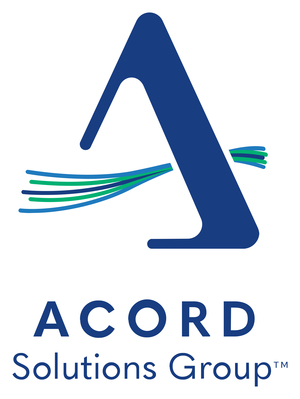PEARL RIVER, N.Y., July 28, 2020 /PRNewswire/ -- ACORD, the global standards-setting body for the insurance industry, today announced the release of Version 1.1 of its Next-Generation Digital Standards for insurance data exchange, the first version of which were released earlier this year. Developed through ongoing collaboration with leading industry organizations, the Standards enable omnichannel information exchange using fine-grained business transactions.
The ACORD Next-Generation Digital Standards are designed to function across any technology interfaces to support data transfer mechanisms such as microservices and RESTful APIs. Applications of these messages include customer-facing mobile apps, the Internet of Things, distributed ledgers, and other cutting-edge technologies.
"Insureds' expectations are no longer shaped by our industry alone," said ACORD President and CEO Bill Pieroni. "Agents and carriers need to be able to fully engage stakeholders across both traditional and digital touchpoints."
ACORD's efforts in this area have been aligned with members of the independent agent community through its standards development partnership with the Agents Council for Technology (ACT), a program of the Independent Insurance Agents & Brokers of America (The Big "I").
"Working with ACORD provides a valuable opportunity for us to enhance the voice of the independent agent in determining our industry's future," said Big "I" President and CEO Bob Rusbuldt. "By increasing the speed, efficiency, and quality of data exchange, the Next-Generation Digital Standards benefit agents, insurers, and ultimately our customers."
ACORD also partnered with leading insurance carriers, brokers, and other organizations to collect user stories which continue to influence the direction, priorities, and form of the Next-Generation Digital Standards. Key partners in this latest release include AIG, Capgemini, Chubb, CNA, DTCC, The Hartford, and W.R. Berkley.
"Insurance product models and distribution paradigms are fast evolving. By engaging non-insurance firms to sell and service at the right 'signature moments,' additional value can be delivered to consumers," said Kiran Boosam, Vice President of Insurance at Capgemini, a global leader in consulting, digital transformation, technology and engineering services, whose contributions around claims form submissions have played a key role in extending the scope of the Standards into new areas. "ACORD is playing a pivotal role in promoting this ecosystem growth, standardizing data exchange. We are excited to participate with ACORD to design the APIs and to offer them on our Open Insurance platform."
Important features in Version 1.1 of the ACORD Next-Generation Digital Standards include expanded support for:
- Electronic payments
- Commercial lines quoting structures for business owners' and workers' comp policies
- Claims movement & placing documents
- Policy administration search inquiries and the carrier-broker distribution channel
- Producer management
- Technical/accounting for distributed ledger technology
The ACORD Next-Generation Digital Standards are available for download by members of ACORD Standards programs across all lines of business. For more information, visit www.acord.org/standards.
About ACORD
ACORD (Association for Cooperative Operations Research and Development) is the global standards-setting body for the insurance and related financial services industries. ACORD facilitates fast, accurate data exchange and efficient workflows through the development of electronic standards, standardized forms, and tools to support their use. ACORD engages thousands of insurance and reinsurance companies, agents and brokers, software providers, financial services organizations and industry associations in more than 100 countries. ACORD maintains offices in New York and London. Learn more at www.acord.org.
CONTACT: |
Beth Jarecki |
917-364-6044 |
SOURCE ACORD

Related Links
WANT YOUR COMPANY'S NEWS FEATURED ON PRNEWSWIRE.COM?
Newsrooms &
Influencers
Digital Media
Outlets
Journalists
Opted In





Share this article